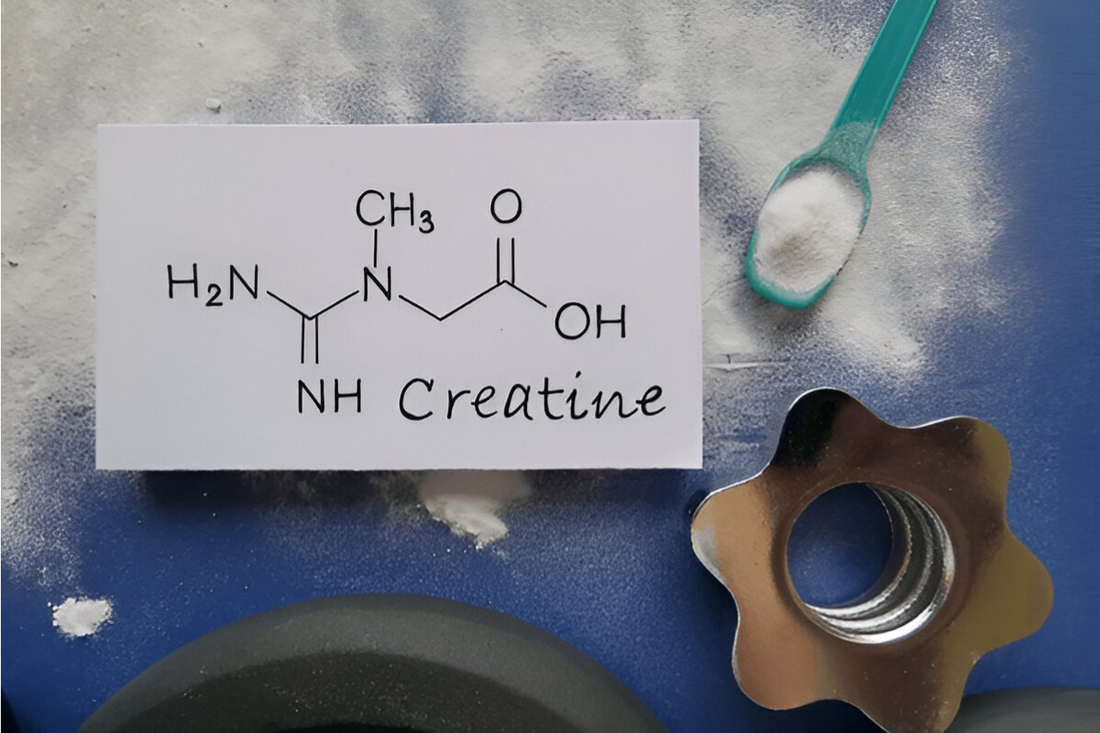
Creatine: Your Body's Secret Energy Weapon
Share
What is Creatine?
Creatine is a naturally occurring compound found in our bodies and in small amounts in certain foods like meat and fish. It plays a crucial role in providing energy to our muscles, making it a popular supplement among athletes and fitness enthusiasts looking to enhance their performance and overall health.
What Is Creatine vs Creatine Monohydrate?
Creatine is the general term for a compound that helps provide energy to your muscles, while Creatine Monohydrate is the most common and well-researched form of creatine supplementation. Creatine monohydrate is a highly effective version of Creatine because it's affordable, easy to find, and has the most proven benefits for improving strength, performance, and recovery.
Understanding ATP: The Body's Energy Currency
At the heart of how Creatine benefits our bodies lies Adenosine Triphosphate (ATP) - the energy currency of our cells. It's the molecule that provides the immediate energy for all cellular activities, including muscle contractions.
How Creatine and ATP Work Together:
Creatine helps replenish ATP, enabling more powerful muscle contractions during short, high-intensity activities like sprinting, weightlifting, or jumping.
Increased ATP Production: Creatine helps our bodies produce more ATP. It does this by increasing the availability of phosphocreatine, a compound that quickly replenishes ATP during intense exercise. This increased ATP availability allows for more powerful and explosive muscle contractions.
Enhanced Exercise Performance: The increased ATP production translates to improved exercise performance, particularly in activities requiring short bursts of high intensity, such as weightlifting, sprinting, and jumping.
Muscle Growth: Creatine supplementation can also contribute to increased muscle mass. This is likely due to a combination of factors, including increased strength gains from improved exercise performance and potential anabolic effects of Creatine on muscle cells.
Creatine Monohydrate Benefits: The Key Advantages for Your Health:
Enhanced Exercise Performance: Creatine may help increase strength and power output, improving high-intensity exercise performance. This can apply to activities like weightlifting, sprinting, and sports requiring quick bursts of energy, as well as everyday tasks like lifting or carrying groceries.
Supports Muscle Mass: Creatine is commonly used to help support muscle mass, especially during high-intensity exercise. It can improve body composition by promoting muscle growth over time when paired with consistent exercise.
Menopause Support: During menopause, women experience a decline in hormones, which can affect muscle mass and bone health. While more research is needed, creatine supplementation may assist in supporting muscle mass maintenance as part of an overall health and exercise plan.
Cognitive Function: Some studies suggest that Creatine may have potential benefits for cognitive function, particularly in areas like memory and brain energy levels. However, more research is being done to confirm these effects.
Healthy Ageing: As we age, our natural Creatine production declines. Creatine supplementation may help maintain muscle mass and strength, which are important for an active and independent lifestyle in older adults. Creatine can be a supportive addition to a healthy ageing strategy, particularly when combined with physical activity.
What Is Micronised Creatine Monohydrate (200 Mesh)?
Creatine is one of the most extensively researched supplements for muscle growth and performance. Micronised Creatine Monohydrate (200 mesh) is an enhanced form of Creatine that offers faster absorption and may reduce gastrointestinal issues. The term ‘200 mesh’ refers to the smaller particle size, which improves solubility, leading to better absorption in muscles.
Debunking Common Myths About Creatine Monohydrate
Myth #1: Creatine causes weight gain and bloating
While Creatine can cause temporary water retention in muscles, this is not fat gain. The water retention helps hydrate muscles, which is essential for performance and recovery.
Myth #2: Creatine causes hair loss
There is no conclusive evidence linking Creatine with hair loss. Some studies have suggested that Creatine may increase DHT levels, but these findings are minimal and have not been definitively proven.
Myth #3: Creatine is only for athletes or weightlifters
Creatine is beneficial for anyone looking to support muscle mass, improve physical performance, and promote healthy ageing. Whether you're an active individual or someone focused on general health, Creatine can help support muscle function.
Creatine for Healthy Ageing
As we age, Creatine production naturally declines, which may affect muscle mass and strength. Supplementing with Creatine can help support muscle function and promote a healthy ageing process when combined with regular exercise. By preserving muscle mass and strength, Creatine supplementation may contribute to maintaining independence and mobility in later years.
Conclusion: Make Creatine Monohydrate Part of Your Daily Routine
Creatine is a safe, effective supplement that can enhance exercise performance, support muscle mass, and help you age well. Whether you're focused on improving strength, boosting recovery, or maintaining muscle health as you age, Creatine Monohydrate offers a variety of benefits. Make it a part of your daily routine to support your active lifestyle and long-term health.
Safety and Disclaimer:
The advice in this article is for informational purposes only and does not constitute medical advice.
Creatine Monohydrate and Taurine are generally regarded as safe for most healthy adults when consumed within the recommended dosages.
Before trying any new supplement, it is important to consult with your General Practitioner (GP) or healthcare professional, especially if you are pregnant, breastfeeding, taking medication, or under medical supervision. Food supplements should not be used as a substitute for a varied and balanced diet and a healthy lifestyle.
While we strive for accuracy and balance, please note that this blog may discuss products available for purchase through ME MAINTAIN | EXTEND®. Always consult a healthcare professional before making any health-related decisions.
Clinical Research
2. Kreider & Stout. Nutrients. 2021;13(2):447. Creatine in Health and Disease.
